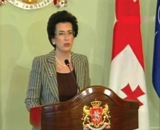Burjanadze: Imedi TV free to resume broadcasting this week
By Nino Mumladze
Tuesday, December 4

In order to ensure democratic conditions and media freedom in the run-up to elections, Imedi TV will be free to resume broadcasting from Wednesday, acting president Nino Burjanadze declared on December 3.
The announcement was “very much welcomed” by EU Special Representative to the South Caucasus Peter Semneby.
“We’ve asked the General Prosecutor’s Office to have the courts unfreeze Imedi’s assets. Once that’s done, there’ll be no obstacle to the resumption of Imedi TV broadcasts,” Burjanadze said.
She added that the decision had been made despite the fact that the station “remains under the ownership and direct control of a presidential candidate,” a reference to business mogul Badri Patarkatsishvili who is running for president in the upcoming January 5 snap elections.
Patarkatsishvili founded the station, although Imedi representatives claim News Corporation are now the sole owners. The government contends, meanwhile, that it has yet to see documents proving this to be the case.
The station’s assets were frozen after a Tbilisi City Court decision, which also suspended Imedi TV’s broadcast license for three months, following allegations that it aired statements encouraging the overthrow of the government after a crackdown on protestors outside parliament last month.
On November 7, police dispersed anti-government demonstrators before raiding Imedi TV, forcing it off air. The administration claim a Moscow-backed coup attempt was under way in Georgia.
Since the threat of a coup has “expired,” Burjanadze said, the government had made a “political decision” to unfreeze assets belonging to Imedi Media Holding, the company which owns Imedi TV and Imedi Radio.
Imedi’s closure prompted statements of concern from foreign governments, the EU and the OSCE, who underlined the necessity of media freedom, particularly in the run-up to elections.
On Saturday, influential Polish media activist Adam Michnik delivered an ultimatum to the government to restore Imedi TV to air within a week, or face condemnation that Georgian democracy is under threat.
EU envoy Peter Semneby, who accompanied Michnik on his visit to Tbilisi, said the EU believed the government decision “will remove question marks we’ve had regarding media issues in the run-up to the presidential campaign.”
However, he added that lifting broadcast restrictions on Imedi TV and the question of when it would actually return to air were two different issues.
Imedi TV representatives claim the station suffered technical damage during the police raid, which they have not been able to assess because police have forbidden access to the premises.
“I’m not in a position to judge whether it will be technically possible for Imedi to start broadcasting on Friday. That’s something we have to determine after technicians inspect the premises on Wednesday,” online media source Civil Georgia quoted Semneby as saying.
Giorgi Targamadze, head of the station’s political programs, welcomed the decision, but stated that Imedi TV would not alter its editorial policy when it resumed broadcasting.
“I completely agree with Burjanadze’s use of the term “political decision” [to unfreeze Imedi’s assets]—it precisely sums up the initial assault against Imedi which was solely a political decision, beyond any legal justification,” Targamadze told the Messenger.